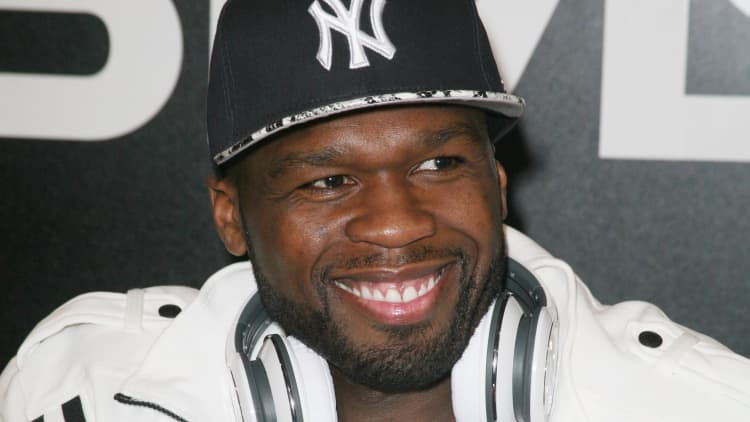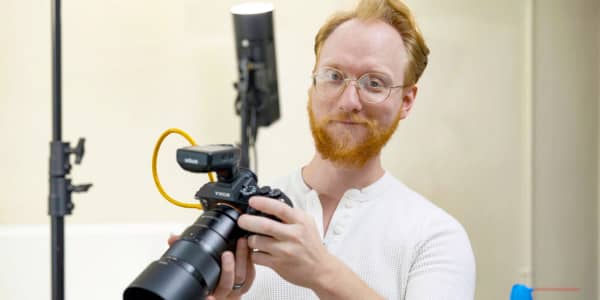50 Cent's SMS Audio is one of the leaders in the growing premium headphone industry, but had history zigged instead of zagged, it's entirely possible the brand would never have been born.
Beats Electronics—the headphone company co-founded by rapper and hip-hop producer Dr. Dre and Interscope Geffen A&M Records chairman Jimmy Iovine, which was bought by Apple for $3 billion last year—had been up and running for three years before 50 Cent, whose real name is Curtis Jackson, launched his premium headphone company. And when he did so, he wasn't prepared for the side effects it would have on his music career.
Celebrity clothing lines, one of the first areas in which musicians branched out into retail, came with a sense of friendly competition. Jackson said he made the mistake of thinking it might be the same with headphones, but he learned competition is much more aggressive in the headphone space.
"When Russell Simmons went into Phat Farm clothing, you saw Rocawear from Jay-Z, you saw Sean John from Puffy, you saw G-Unit from myself, and then numerous other companies," he said. "It showed us that you could successfully utilize the influence generated from music to market things other than music."
Several top musicians are cashing in on their celebrity in the premium headphone market. Dre and Iovine were the first to make headphones a cultural movement, releasing versions for artists like Lady Gaga, P Diddy and Justin Bieber.
Beats is Nike. We're Adidas.50 Centreferring to his premium headphone company, SMS Audio
Jackson's decision to launch SMS came out of a sense of frustration with Beats, but that frustration only grew after the launch.
It wasn't just a feeling that his records were not promoted at the same level as other artists that had deals with Beats once he launched SMS. He was unable to wear SMS headphones in music videos for anything he released on Interscope. Even an SMS hat he wore in one saw the logo blurred out.
While he said that the decision to launch SMS wasn't a mistake, he added that it's something he could have handled better.
"I would have had communications with Jimmy [Iovine]," Jackson said. "The owner of Beats owned the record company I was on, and I had to get off the record company in order to make music again. He was looking at me as a direct competitor."
Last year, in an amicable divorce with Iovine's label, he took his G-Unit Records independent.
"Whenever a company makes a deal, there's a different house on the other side of the street, ya know? So I went over to that house," Jackson said. Or put another way: "Beats is Nike. We're Adidas."
Beats' big boom

Recent data on headphone sales suggests Beats is more than a few steps ahead in the race.
Premium headphone sales in the U.S. topped $1 billion in 2013, an 11 percent increase over the previous year, according to The NPD Group's retail tracking service. But it's in the most recent 12-month period tracked by NPD that Beats really asserted itself and built up a big lead over the competition. Total headphone sales—encompassing below-$100 headphones and the premium models above that—in the 12 months ended Jan. 15 reached $2.6 billion. In that period, Beats took in one-third of all headphone industry revenue. SMS Audio has less than 1 percent of sales, according to NPD data.
Building sizable market share in the headphone space today is critical, because the industry is beginning to mature. NPD analyst Ben Arnold said the growth rate has come down from 50 percent or more annually to mid-teens percentage growth.
"It's reached the size where it won't grow two-thirds year-over-year," Arnold said, adding, "It is extremely hard to grow. You're not just dealing with Beats but Bose, Sony, Skullcandy and other lifestyle headphone companies."
The top three in the overall headphone market are Beats, Bose and Sony, according to NPD. In premium, specifically, it's Beats, Bose and Jaybird.
Read MoreFans give millions to bring Avatar back to the gaming screen
Jackson leaned heavily on his fame in the early days of SMS. First, though, he needed a product. After founding the company in 2011, he acquired Kono Audio to speed up turnaround of the first products.
"They had already worked through the kinks with the early products they created," he said. "It made it a lot easier to make my vision for SMS come to life."
When you say Sony, I see an image of Asian people in suits. When you pick a person to connect to a company and that person has a cool factor around them, people will look at it and appreciate it.
One of the keys to its continued success, Jackson said, is that SMS Audio doesn't pay celebrities to promote its brands. It convinces them to pay the company by offering them the chance at small ownership stakes, which makes them more invested in the company's success.
"When you have a licensing agreement, you just do what you agreed to," Jackson said. "You may spend an hour or so at a booth. For me, I'll spend three to four days at CES [the Consumer Electronics Show] because it's my company and I'm invested in it. ... I don't mind partners. When I started [SMS], I had it all, but you can [add] partners who are strong enough to go to the end game."
Recruiting the right celebrities is also a core mission for SMS. "When you say Sony, I see an image of Asian people in suits," Jackson said. "When you pick a person to connect to a company and that person has a cool factor around them, people will look at it and appreciate it."
Among those endorsing partners is Knicks power forward Carmelo Anthony.
Coolness isn't limited to individuals, either. SMS and Lucasfilm launched a partnership last year that strongly resonated with consumers. The first line of headphones, based on the Star Wars films and selling at $200 per pair, shattered everyone's expectations.
"Star Wars was an attractive and important license because it is attractive to the youth market," NPD's Arnold said.
Jackson said what the company projected for first-quarter sales was reached in two days, though the company declined to share its projections or sales. SMS Audio has never released sales or earnings numbers. Among the only publicly available sales data for SMS is from 2012, when Jackson went on QVC to sell the headphones and sold more than $175,000 worth in nine minutes.
SMS Audio headphones retail for $125–$400 per pair. A second line is due in the second quarter of this year.
Read MoreTry something new: To be a success, don't go to college
While Beats may be viewed as the leader in the premium headphone space, especially since the Apple acquisition, Jackson said SMS is more than content with its current standing. A recent deal with Intel (which resulted in earbuds with embedded biometric sensors that collect fitness data, including heart rate, without the need for regular charges) shows that the company is willing to explore new areas to help it expand.
Arnold said that Jackson is hitting on all the right tech trends in the headphone market, from the new focus on sensors and biometrics to wireless headphones and the licensing deals. But the analyst said the headphone market will continue to be challenging. "It's very hard to strike lightning like Beats has. Everyone can see what is fueling growth, and lots of them are trying similar ideas."
Lessons learned
1. Partners are more valuable than spokespersons. By giving people a stake in the company, they'll work that much harder to promote it.
2. Be careful mixing different business ventures. That can result in unintended, and debilitating, side effects.
3. Brand passion doesn't have to be temporary. Strive to create something people will love for a long time.
—By Chris Morris, special to CNBC.com




